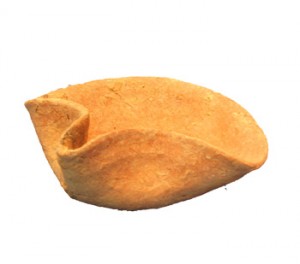From the Category, “The Eastern Eye”
[The Bible is an “Eastern” book. It was written many years ago in the “East” which today we refer to as “The Middle East.” As such, there are many customs and idioms that are not familiar to the “Western” mind.
In understanding the Scriptures it is important for us to understand the culture, but it doesn’t mean that we should necessarily follow that culture. Rather, it is in the understanding of the Eastern culture that we gain light and understanding about many things in the Bible.]
 On his way to Rome, the Apostle Paul was shipwrecked and ended up on the island of present day Malta, which is referred to as Melita in the Bible. It was miraculous that in the midst of a horrendous storm, everyone made it to shore safely.
On his way to Rome, the Apostle Paul was shipwrecked and ended up on the island of present day Malta, which is referred to as Melita in the Bible. It was miraculous that in the midst of a horrendous storm, everyone made it to shore safely.
On that cold, rainy night, Paul and others were gathered around a fire to warm themselves. The barbarous people of the island kindled the fire. Barbarous simply means that they spoke a different language.
The account in Acts 28 goes on to say that Paul gathered a bundle of sticks, but after putting them on the fire, a viper came out of the fire and fastened itself on his hand.
In the lands and times of the Bible, those warmed by a fire were expected to contribute to the firs. This is why Paul contributed to the fire by placing a bundle of sticks on it.
A Deadly Viper
This viper that attacked Paul was very deadly; it was six to eight inches long with a very pointed head. According to Bishop Pillai, these vipers could sink their fangs an inch deep into your skin, and then release their deadly poison. After this type of viper strikes, it dies. It is very difficult to pull the viper out even after it is dead.
Easterners believed if a man murdered and then ran away, escaping the law, a viper would hunt him, find him, and justice would be served. That is why when the people of Malta saw the viper hanging from Paul’s hand, they assumed he was a murderer who had escaped justice and was now getting what he deserved: death.
him, and justice would be served. That is why when the people of Malta saw the viper hanging from Paul’s hand, they assumed he was a murderer who had escaped justice and was now getting what he deserved: death.
But Paul did not die; he operated a power that is far greater than deadly viper poison – the power of God. The record says he simply shook off the viper into the fire and felt no harm. It was miraculous to shake it off, considering how vipers attach to the skin, and it was also miraculous that he was not harmed at all from the viper.
Can We Shake Off?
What about the circumstances and situations that we are confronted with? Can we shake off the venomous vipers of negatives and remain unaffected by them? We have the ability to put off, or cast down, whatever thoughts we choose, and then to replace those thoughts with the truth of God’s Word. We also have the ability to operate the power of God.
The type of viper which bit Paul would typically leave the victim dead within 20 minutes after the strike. There was no cure, and there was no way to pull the viper off. And yet, Paul just shook it off, and the people of the island couldn’t believe that he didn’t fall over dead.
It was after a period of time, when Paul showed no signs of any harm, that the natives changed their minds and declared that Paul was a god. That is certainly understandable, isn’t it? They believed that their god would send a viper to execute justice, and since in this case the deadly viper had no effect, they concluded the man must be a god.
Stranded For Three Months
Paul and those with him were stranded on that island for three months waiting for another ship. But Paul ministered to the people on the island, including bringing healing to the father of the chief man on the island. The incident with the viper certainly opened some doors for Paul to minister and teach.
 A number of years ago, while briefly visiting the island of Malta, I took a trip to what is called, St. Paul’s Bay, the area they believe Paul and the rest from the ship landed. It was exciting to be where Paul may have been in what was an awful, life threatening situation.
A number of years ago, while briefly visiting the island of Malta, I took a trip to what is called, St. Paul’s Bay, the area they believe Paul and the rest from the ship landed. It was exciting to be where Paul may have been in what was an awful, life threatening situation.
But, God delivered him and everyone else on the ship from a very deadly storm. He ended up on the shore, obviously soaking wet on a cold rainy night. Then, as he tried to get warm by a fire, a viper attached to his hand!
What happened in Paul’s mind in the few seconds from the attacking to the shaking off, I do not know. I do know that in one sense, because of everything that had just happened, it wouldn’t seem like the ideal time to be peaceful. But he obviously trusted and believed God.
And even though we may not end up with a viper hanging on our hand, we still do face our own circumstances and situations, some more serious than others. We must choose to mentally shake off the fear and worries, and replace them with the promises from God. We have the ability to put off whatever thoughts we choose, and then to replace those thoughts with the truth of God’s Word.
Acts 28:1-11
And when they were escaped, then they knew that the island was called Melita.
And the barbarous people shewed us no little kindness: for they kindled a fire, and received us every one, because of the present rain, and because of the cold.
And when Paul had gathered a bundle of sticks, and laid them on the fire, there came a viper out of the heat, and fastened on his hand.
And when the barbarians saw the venomous beast hang on his hand, they said among themselves, No doubt this man is a murderer, whom, though he hath escaped the sea, yet vengeance suffers not to live.
And he shook off the beast into the fire, and felt no harm.
Howbeit they looked when he should have swollen, or fallen down dead suddenly: but after they had looked a great while, and saw no harm come to him, they changed their minds, and said that he was a god.
In the same quarters were possessions of the chief man of the island, whose name was Publius; who received us, and lodged us three days courteously.
And it came to pass, that the father of Publius lay sick of a fever and of a bloody flux: to whom Paul entered in, and prayed, and laid his hands on him, and healed him.
So when this was done, others also, which had diseases in the island, came, and were healed:
Who also honored us with many honors; and when we departed, they laded us with such things as were necessary.
And after three months we departed in a ship of Alexandria, which had wintered in the isle, whose sign was Castor and Pollux.
Mike Verdicchio
2012
Leave A Comment!
Do you have some thoughts about this? We’d love to hear what you think. To leave a comment if you are receiving this post via email or RSS, just click the title above and scroll to the bottom of the post and type in your comment. If not, just scroll to the bottom of this post and type in your comment.
Share This Article!
To share this article on social media, like Facebook, or, Twitter, there are links below.
Resources
There are a number of books that you can read to get insight on customs, manners, idioms and meanings from the Eastern culture in which the Bible was written. The best I know of were written by Bishop K. C. Pillai. I have had the pleasure of listening to many recorded teaching by him.
He wrote three books, and they are hard to find, and are usually over priced. But, if you want to you can check this link to see what Amazon has to offer. Light Through an Eastern Window
Another great resource that I have used for years is a book called, “Manners and Customs of the Bible,” by James Freeman. Mine was printed in 1972 and I know they have newer additions. For the newest edition, just click the link and it will take you to Amazon. The New Manners and Customs of the Bible (Pure Gold Classics)







